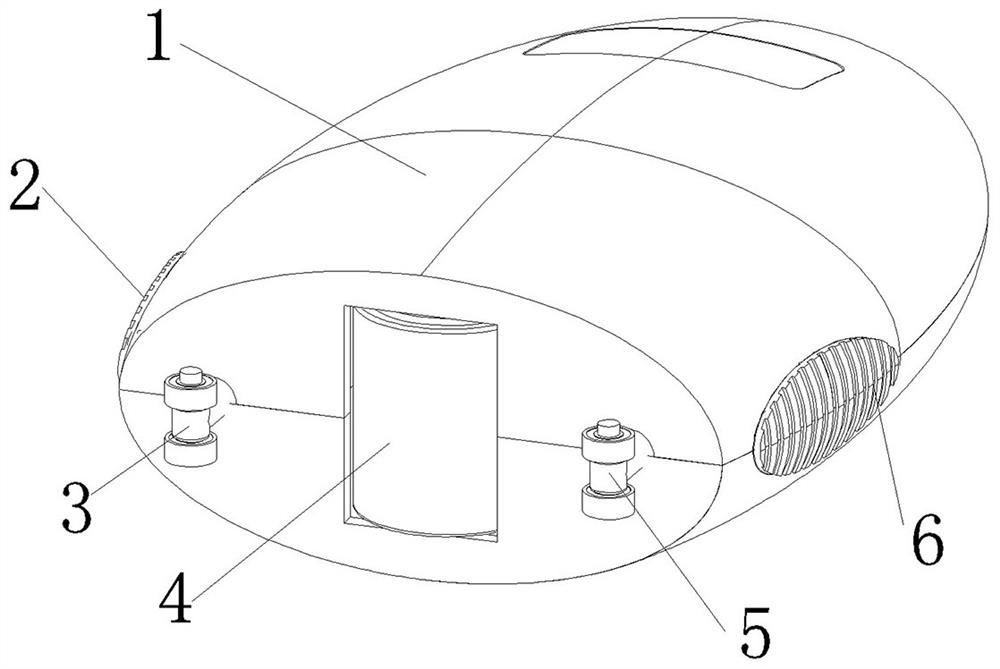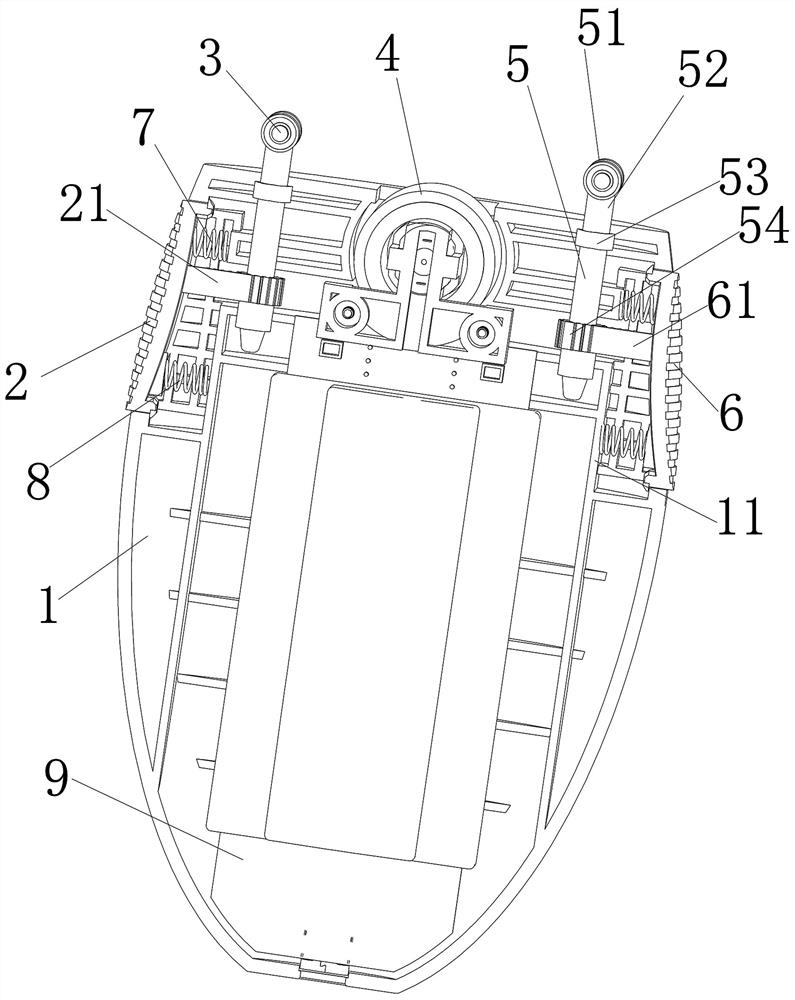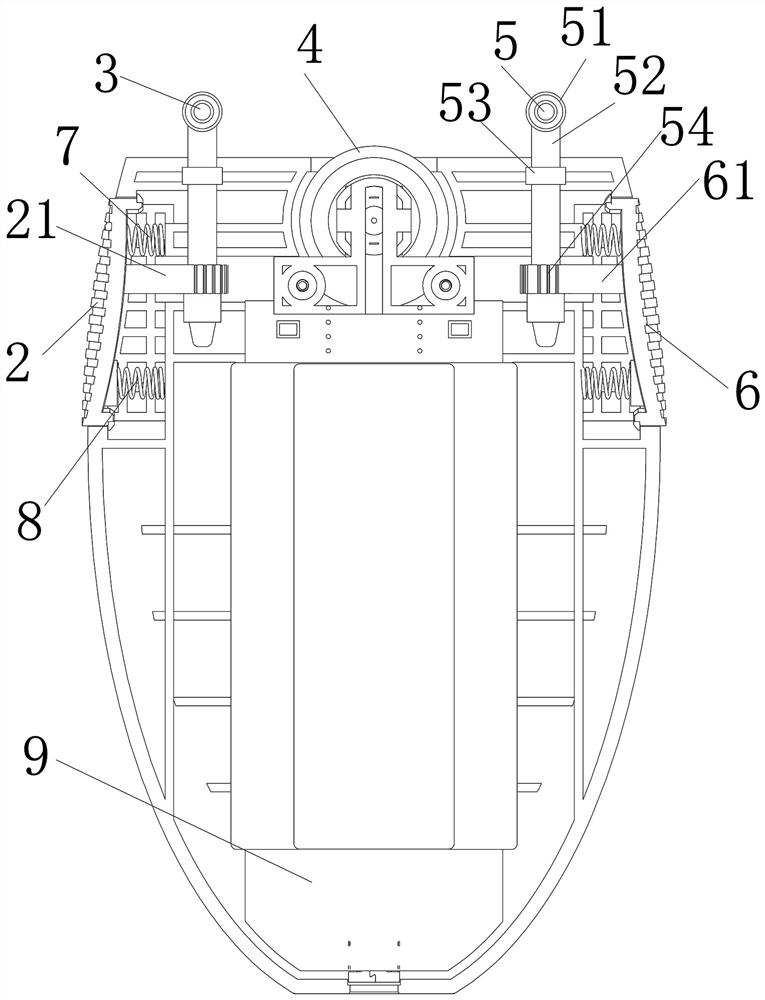Curtain control device
A technology for control devices and curtains, applied to window decorations, applications, home appliances, etc., can solve the problems of poor user comfort and large local force, and achieve the effect of small force and good comfort
- Summary
- Abstract
- Description
- Claims
- Application Information
AI Technical Summary
Problems solved by technology
Method used
Image
Examples
specific Embodiment 1
[0065] The structure of the curtain control device in this embodiment is as follows: Figures 1 to 5 As shown, it is used to cooperate with the internal type track. The curtain control device includes a housing 1 as a whole, and the top of the housing 1 is provided with a lower push wheel 4, a front upper pressure wheel assembly 3 and a rear upper pressure wheel assembly 5. , most of the lower pushing wheels 4 are located inside the housing, and a small part protrudes from the top of the housing 1, so as to be used for rolling and press-fitting with the lower side of the bottom wall of the inner rail, and the upper pressing wheel assembly 3 and The upper pressure wheel 51 on the top of the upper pressure wheel assembly 5 on the rear side protrudes upwards and is used to extend into the inner cavity of the inner type track, and roll and press fit with the upper side of the inner type track bottom wall.
[0066] The structures of the upper pressure wheel assembly 3 on the front ...
specific Embodiment 2
[0081] It differs from Embodiment 1 mainly in that: in Embodiment 1, both the front transmission mechanism and the rear transmission mechanism are rack and pinion mechanisms. In this embodiment, the front transmission mechanism and the rear transmission mechanism can also be link transmission mechanisms, the link transmission mechanism includes a connecting rod, a transmission disc is arranged on the wheel shaft, one end of the connecting rod is hinged with the transmission disc, and the other end is connected with the assembly The button is hinged. When the button is moved forward and backward, the connecting rod can drive the transmission plate to rotate, and then drive the wheel shaft to rotate back and forth.
[0082] It should be noted that when using the linkage mechanism, attention should be paid to avoid dead point problems, for example: if the rotating shaft reaches the assembly and disassembly position when it is rotated 90° from the working position, the linkage can ...
specific Embodiment 3
[0085] The main difference between it and Embodiment 1 lies in that in Embodiment 1, the mounting and dismounting buttons on both sides drive the two axles of the pressing wheel assembly on both sides to rotate synchronously through different transmission mechanisms. In this embodiment, the wheel shafts of the pressure wheel assemblies on both sides can be driven to rotate through the synchronous transmission mechanism by the joint force of the mounting and dismounting buttons on both sides. The synchronous transmission mechanism here is a rack and pinion transmission mechanism. Two gears on the first wheel shaft, and the front gear fixedly connected with the front side installation and removal button, the rear side gear fixedly connected with the rear side installation and removal button, the front side gear meshes with the two gears on the two wheel shafts respectively, The rear side gear is also meshed with two gears on the two wheel shafts respectively, so that when the two...
PUM
 Login to View More
Login to View More Abstract
Description
Claims
Application Information
 Login to View More
Login to View More - R&D
- Intellectual Property
- Life Sciences
- Materials
- Tech Scout
- Unparalleled Data Quality
- Higher Quality Content
- 60% Fewer Hallucinations
Browse by: Latest US Patents, China's latest patents, Technical Efficacy Thesaurus, Application Domain, Technology Topic, Popular Technical Reports.
© 2025 PatSnap. All rights reserved.Legal|Privacy policy|Modern Slavery Act Transparency Statement|Sitemap|About US| Contact US: help@patsnap.com



